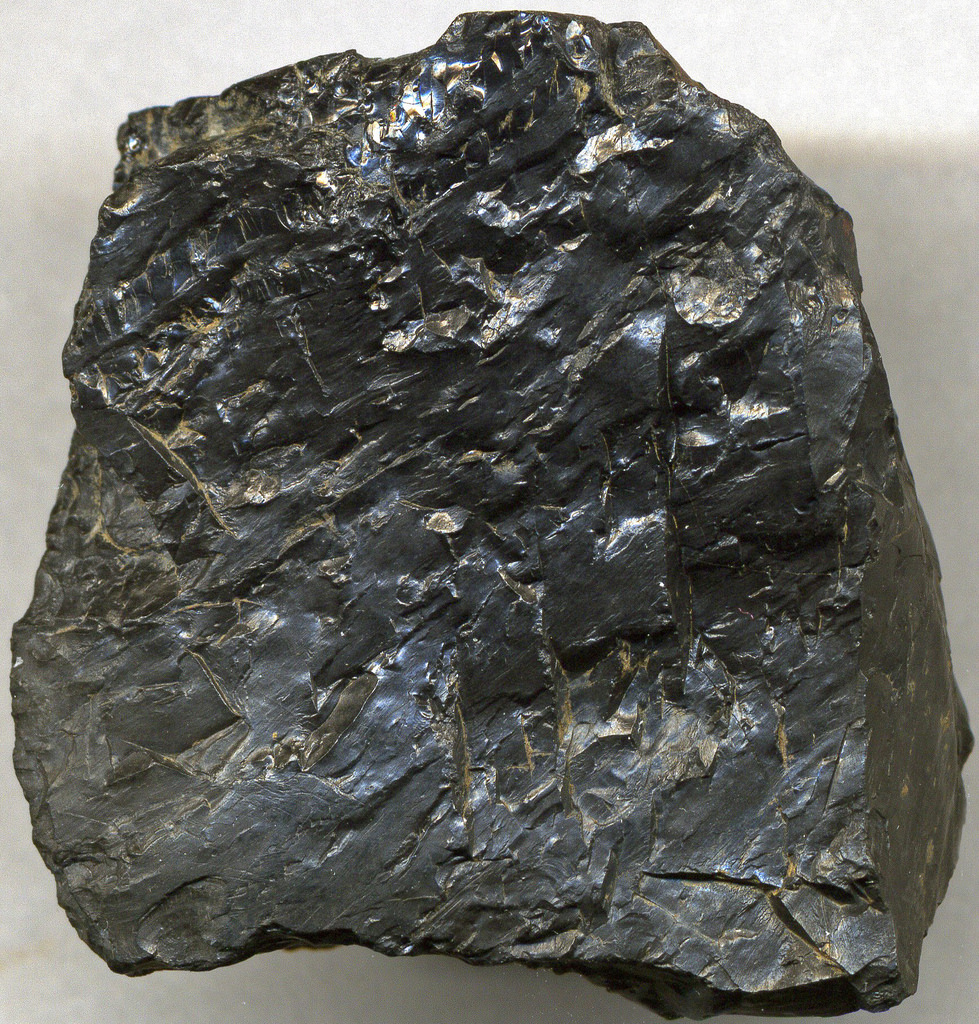Bituminous coal coal is the official state rock of West Virginia and Utah, and the state mineral of Kentucky. Photo by James St. John / Flickr (use permitted with attribution).
Official State Rock of West Virginia
West Virginia designated bituminous coal as the state rock in 2009 to symbolize the integral part the coal industry has played in the "economic and social fabric of the state." Coal is also a state symbol of Kentucky and Utah. All State Rocks & Minerals
The movement to adopt coal as the state rock of West Virginia was started by high school student Britnee Gibson, a senior at Gilbert High School in Mingo County, West Virginia (and a coal miner’s daughter).
Coal is an organic sedimentary rock composed largely of carbon, a fossil fuel formed from the remains of plants. There are four basic types of coal: lignite, subbituminous, bituminous and anthracite. Bituminous has a higher heating value than either lignite or subbituminous, but less than that of anthracite. Approximately 50% of the coal produced in the United States is bituminous coal.
"More than one-third of the coal produced in the United States comes from the Appalachian coal region. West Virginia is the largest coal-producing state in the region, and the second largest coal-producing state in the United States" (West Virginia Coal Association).
House Concurrent Resolution NO. 37
WHEREAS, From the very early days of European exploration of what is now West Virginia, the presence of coal was duly noted; and
WHEREAS, For example, in 1742 the first discovery of coal by an European explorer was made by John Peter Salley in the area now near Racine, West Virginia. John Peter Salley, therefore, named the nearby tributary of the Kanawha River where he observed the coal deposit as the Coal River; and
WHEREAS, In 1770 George Washington noted "a coal hill on fire" near West Columbia in current Mason County; and
WHEREAS, In 1810 the first commercial coal mine opened near Wheeling by Conrad Cotts for blacksmithing and domestic use; and
WHEREAS, The coal industry has evolved into and has been for many years an integral part of the economic and social fabric of the state; and
WHEREAS, Bituminous Coal is found naturally deposited in the vast majority of the fifty-five counties of our great state; and
WHEREAS, Whereby many of those deposits have great economic importance and also where extensive mining operations are located; and
WHEREAS, Whole communities in this state rely in large part, if not completely, on the Bituminous Coal industry for their continuing vitality; and
WHEREAS, Bituminous Coal is used as a major product in the manufacturing or steel used in the many automobiles in the country; and
WHEREAS, Bituminous Coal is used in the chemical industries and in the manufacturing of hundreds of other products, such as medicines, that enhance our quality of life; and
WHEREAS, West Virginia is the second largest Bituminous Coal producing state in the United States. For example, in 2008 there were 157,456 short tons of Bituminous Coal mined within West Virginia; and
WHEREAS, Many experts have asserted there is another five hundred years worth of commercially viable Bituminous Coal yet to be mined within West Virginia; and
WHEREAS, The Bituminous Coal industry remains essential to economic growth and progress in West Virginia and the United States; and
WHEREAS, It is fitting that a substance critical to the economic well-being of this great State of West Virginia and otherwise steeped in its history as Bituminous Coal be recognized as the official state rock of West Virginia; therefore, be it
RESOLVED by the Legislature of West Virginia: That Bituminous Coal is hereby designated and declared to be the official state rock; and, be it
FURTHER RESOLVED, That the Clerk of the House of Delegates forward a certified copy of this resolution to Britnee Gibson, a senior, currently enrolled at Gilbert High School in Mingo County, West Virginia.

